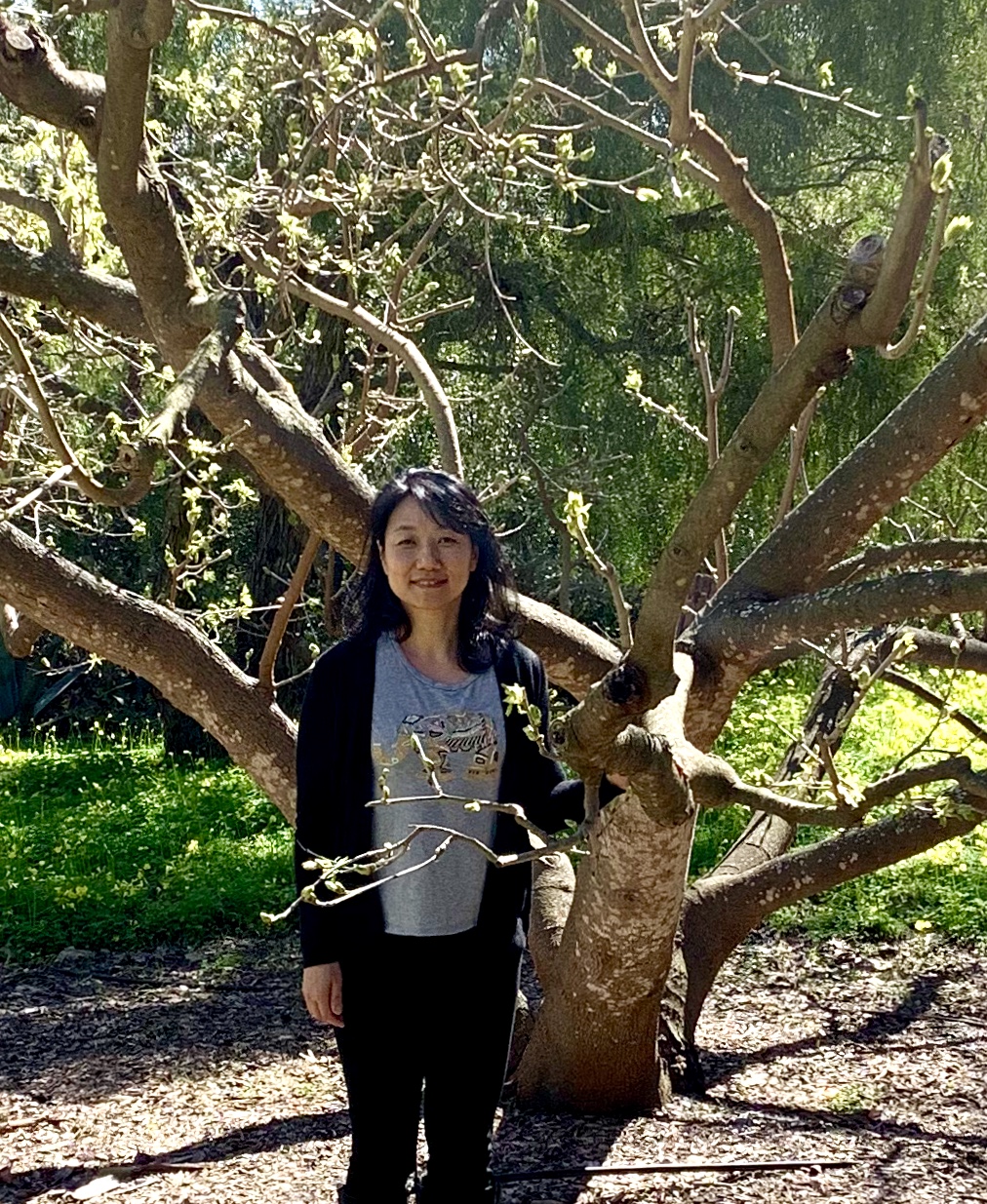A blog post by Melissa Ruisz Nazario based on an interview with Heesun Kim, LMSW.
Many times, when prospective students visit Pacifica, they describe their experience as feeling “called” to the school, perhaps because of the campus, the community of people they meet, and oftentimes, Pacifica’s mission “to tend to the soul in and of the world.”
Similarly, when Heesun Kim, LMSW, a first year student in Pacifica’s Ph.D. Program in Depth Psychology with Specialization in Integrative Therapy and Healing Practices, first arrived at the Lambert Road campus in Santa Barbara, she felt it was a homecoming.
Read More
Posted in:
Psychology,
depth psychology,
Pacifica Students,
Pacifica Graduate Institute,
narrative,
interview,
Integrative Therapy & Healing Practices
A blog post by Melissa Ruisz Nazario based on an interview with Heesun Kim, LMSW.
About five or six years ago, Heesun Kim, LMSW, a student in Pacifica’s Ph.D. Program in Integrative Therapy and Healing Practices, was on the subway in New York City, and she noticed a woman sitting in front of her with tears streaming down her face. She was trying so hard to hold in those tears. It was a face that felt very familiar to Heesun, and she thought about the many times she had been in a similar situation.
“So I remember I was, a couple times, I ended up in the public bathroom, so I had to cry there,” she says. “And then I thought, you know, my grief, my sadness or all this sorrow needs to be respected, not in the corner of a public bathroom.”
Read More
Posted in:
The Psyche,
transformative,
Psychology,
depth psychology,
images,
Pacifica Graduate Institute,
narrative,
somatic,
relationship,
relationships,
interview,
Integrative Therapy & Healing Practices
A blog post by Melissa Ruisz Nazario based on a webinar presented by Keiron Le Grice, Ph.D.
What is archetypal cosmology, and why might you want to study it? Check out the post Archetypal Cosmology, Part I: Beyond Outer and Inner Space for a more in-depth description that gives background on the field.
To summarize, archetypal cosmology is a new discipline but rooted in the ancient practice of astrology. It is based on the idea that the celestial bodies like the solar system’s planets and the sun and their relative configurations reflect the deep order of the psyche—the psyche being the totality of psychological experience, according to C.G. Jung.
Read More
Posted in:
The Psyche,
James Hillman,
archetypes,
Psychology,
soul,
depth psychology,
psyche,
humanities,
Pacifica Graduate Institute,
sacred,
cosmology,
symbolism,
Spiritual
A blog post by Melissa Ruisz Nazario based on a webinar presented by Keiron Le Grice, Ph.D.
Astrology is the ancient practice of looking at the relative positions of celestial bodies and their relationship and influence on earth, the natural world, and humans. [1] Depth psychology has to do with psychologies and therapies involving “the exploration of the subtle, unconscious, and transpersonal aspects of human experience.” [2]
Read More
Posted in:
The Psyche,
James Hillman,
archetypes,
Psychology,
soul,
depth psychology,
psyche,
humanities,
Pacifica Graduate Institute,
sacred,
cosmology,
symbolism,
Spiritual
A blog post by Melissa Ruisz Nazario based on a webinar presented by Susan Rowland, Ph.D.
“Depth psychology is a psychology of the creative imagination,” says Susan Rowland, Ph.D., Chair of Pacifica’s M.A. program in Engaged Humanities and the Creative Life. She explains that while depth psychology originated and continues to be a powerful form of psychotherapy, its devotion to the creative imagination makes it important beyond the consulting room.
Read More
Posted in:
Joseph Campbell,
archetypes,
Psychology,
soul,
depth psychology,
humanities,
Pacifica Graduate Institute,
sacred,
symbolism,
Spiritual
Is personal, intellectual, or creative growth one of your goals for this year, or for your life in general? Do you long to connect with others interested in the intersections of art, soul, and depth psychology? Let one of Pacifica’s upcoming events this spring be the catalyst for you to plug into our like-minded community, and get ready to experience and engage in deep, meaningful conversations where you are able to hold space for each other and learn new, exciting ways to explore your creative potential.
Read More
Posted in:
Pacifica Events,
Pacifica News,
Santa Barbara,
graduate school,
creativity,
art,
vocation,
Education,
depth psychology,
active imagination,
Pacifica Students,
Pacifica Graduate Institute,
resources
A guest blog post by Craig Chalquist, Ph.D., Associate Provost of Pacifica Graduate Institute.
Today is January 9th, which fans of the Great Detective have decided is his birthday. For those into astrology, this would make his natal sun sign studious, hard-working Capricorn. Sir Arthur Conan Doyle’s novels give no indication of the time of day Holmes was born, but I have a feeling, given his interests and how he pursued them, that his natal chart is nocturnal. No doubt Virgo, Mercury, Pluto, and Saturn had a lot to say to each other in it, especially in Houses 12 (secrets, mysteries) and 8 (death, rebirth, other people’s money).
I encountered Holmes as a result of committing a crime. When I was in high school, a bully made the mistake of picking on my friends and me. The school authorities did nothing, so I knocked him out at lunchtime and set his locker on fire for good measure.
Read More
Posted in:
C.G. Jung,
Psychology,
alchemy,
depth psychology,
narrative,
storytelling,
alchemist,
jungian,
relationship,
relationships
A blog post by Melissa Ruisz Nazario
In the preface to the thirtieth anniversary edition of her seminal book, Writing Down the Bones [1], first published in 1986, Natalie Goldberg explains why she thinks so many people want to write.
“I don’t think everyone wants to create the great American novel, but we all have a dream of telling our stories–of realizing what we think, feel, and see before we die,” she observes. “Writing is a path to meet ourselves.”
The “bones” Goldberg wants her students to write down is, in her words, “the essential, awake speech of their minds.” She acknowledges this is easier said than done: “But I also know that I can’t just say, okay, write clearly and with great honesty. In class, we try different techniques and methods. Eventually the students hit the mark, come home to what they need to say and how they need to say it.”
Read More
Posted in:
Joseph Campbell,
archetypes,
Psychology,
soul,
depth psychology,
sacred,
symbolism,
Spiritual
A guest blog post by Mary A. Wood, Ph.D., co-Chair of the M.A. Program in Engaged Humanities and the Creative Life at Pacifica Graduate Institute.
“The soul should always stand ajar, ready to welcome the ecstatic experience.” —Emily Dickinson
There are moments in life when time seems to stand still—moments when we find ourselves transfixed, and eventually transformed. These moments can be cosmic in scale, as reflected in the awe that we feel when beholding a rare solar eclipse, or an approaching storm. These moments may also be quite intimate, but no less moving, such as when we witness an animal emerging from hiding or when we hear an exquisite song. We recognize, and always remember these moments because they are announced by bodily sensations; we gasp, our hearts beat faster, and tears often flow. Our bodies tell us that the ordinary has given way to the extraordinary. These experiences are best described as “aesthetic,” as we find ourselves living, at least for a few moments, as creatures that are gloriously and achingly alive.
Read More
Posted in:
Joseph Campbell,
The Psyche,
James Hillman,
archetypes,
transformative,
C.G. Jung,
Psychology,
art,
soul,
depth psychology,
symbol,
mythological,
humanities,
sacred,
symbolism,
Spiritual
A blog post by Melissa Ruisz Nazario
At this time of year in the northern hemisphere, the earth’s axis orients away from the sun, temperatures cool, and many of us celebrate with loved ones some form of thankfulness and respite from work–modern iterations of our ancestors’ harvest festivals.
Though the concept of gratitude is also ancient, it has become a bit of a modern buzzword. So, is gratitude really as beneficial as the masses say it is? Actually, yes. Robert A. Emmons and Robin Stern, researchers known for their work in studying gratitude, reviewed studies on the subject and list several of the physical, emotional, and psychological outcomes of cultivating gratitude in “Gratitude as a Psychotherapeutic Intervention.” [1]
Read More
Posted in:
The Psyche,
archetypes,
transformative,
Psychology,
soul,
depth psychology,
mythological,
Spiritual,
resources





.jpg)







